
STORY HIGHLIGHTS
- Centrist candidate Hassan Rouhani holds a healthy lead, according to early results
- State media: About 70% voter turnout in a nation of 50 million eligible voters
- If no candidate gets a majority, there will be a runoff next week
- The last election resulted in bloody street protests known as the “Green Movement”
(CNN) — Iran’s presidential election results trickled in Saturday, with early tallies giving centrist candidate Hassan Rouhani a clear lead, according to the Interior Ministry.
Iranian officials reported a high turnout, with some 70% of some 50 million registered voters — men and women, young and old — turning out, according to state-run Press TV.
The lines extended into the street at times, as voters waited to pick their choice to succeed two-term President Mahmoud Ahmadinejad.
Based on early results, centrist candidate Hassan Rouhani had more votes than any other candidate, Interior Ministry officials said Saturday.
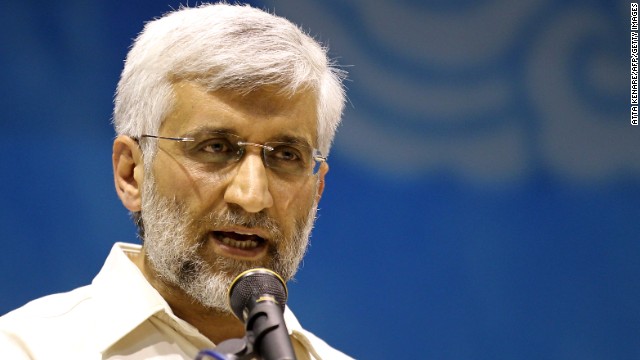 Saeed Jalili is Iran’s chief nuclear negotiator and represents Iran in talks with the European Union.
Saeed Jalili is Iran’s chief nuclear negotiator and represents Iran in talks with the European Union. Who’s running for Iran’s presidency?
Who’s running for Iran’s presidency?
Who’s running for Iran’s presidency?
Who’s running for Iran’s presidency?
Who’s running for Iran’s presidency?
Who’s running for Iran’s presidency?
HIDE CAPTION
<<
<</span>
>
>>
 Who’s running for Iran’s presidency?
Who’s running for Iran’s presidency? 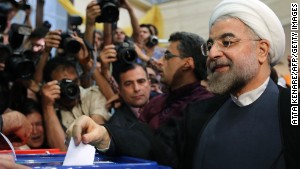 Who are Iran’s presidential candidates?
Who are Iran’s presidential candidates?
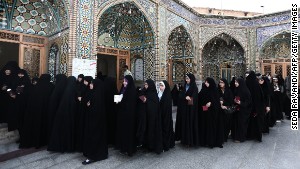 Female voters hopeful as Iran votes
Female voters hopeful as Iran votes
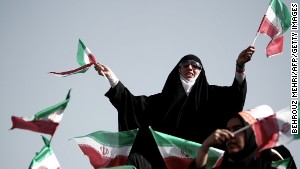 Iran elections: Why 2013 isn’t like 2009
Iran elections: Why 2013 isn’t like 2009
As of noon Saturday local time, Rouhani had 6,049,655 votes, Mohammad Bagher Ghalibaf had 1,844,463; Saeed Jalili had 1,400,712; Mohsen Rezaei had 1,518,964; Ali-Akbar Velayati had 729,044; and Mohammad Gharazi had 143,301.
Officials at the Interior Ministry’s election headquarters said that 11,686,139 valid ballots — of 12,091,699 in total — had been counted at 21,376 polling stations so far.
These votes still represent only a fraction of the total vote. If the 70% turnout figure is correct, there would be about 35 million votes.
When the final tally does come in, that doesn’t necessarily mean the election is over. If no single candidate gets more than half the vote, the top two finishers will face off in a runoff June 21.
That victor will take Ahmadinejad’s mantle as one of the country’s most visible figures, at a time when it’s dealing with widespread sanctions tied to international concern over its nuclear program.
But he won’t be Iran’s most powerful man: That distinction belongs to Ayatollah Ali Khamenei, who has been Iran’s supreme leader since 1989. He’s got plenty of backing, from conservative citizens to loyalist militia groups to, most notably, the Revolutionary Guard.
“Whoever is president, he’s going to have his hands relatively tied by the Revolutionary Guard if they don’t really like what he’s doing,” said Alireza Nader, a policy analyst at the Rand Corporation think tank.
Centrist candidate complained of irregularities
This reality of Iranian governance, though, didn’t prevent 680 men and women from officially seeking the office. The Guardian Council — a non-elected body made up of six clerics and six lawyers operating under the oversight of the supreme leader — narrowed that group down to eight. Two of those subsequently dropped out.
The final six contenders don’t include any women. Nor do they include Ahmadinejad’s aide and protege Esfandiar Rahim Mashaei, who was among those excluded by the Guardian Council.
Velayati, Ghalibaf and Jalili, who is Iran’s chief nuclear negotiator, are considered close to Khamenei and would be unlikely to challenge his authority. Of the three, Jalili saw the most popular support going into the vote.
Rouhani, meanwhile, has the backing of the highly influential former President Akbar Hashemi Rafsanjani.
Hours into the voting, Rouhani complained of a voting irregularity. A reform candidate, Mohammed Aref, who dropped out of the race earlier in the week, is still on some ballots.
Rouhani was worried that voters might mistakenly select Aref, which would amount to a vote thrown away. It was not clear how many ballot papers were concerned.
CNN’s view on the streets of Tehran
Iran’s semi-official Mehr News reported via Twitter that voting lines got longer in the afternoon, and that there were insufficient voting slips in some polling stations.
CNN’s Erin Burnett on 2013 vs. 2009 elections
2009 chaos
Four years ago, when allegations of election fraud sparked widespread protests, Iran’s police and the Basij, a feared paramilitary group, cracked down on the opposition Green Movement.
Protesters were jailed, and human rights groups alleged many were tortured and killed behind bars while the government quashed the uprising.
Reform politicians representing the movement, including Ahmadinejad’s election rival, former Prime Minister Mir Hossein Moussavi, have been under house arrest since 2011.
Despite the unrest, Ahmadinejad’s re-election was formally certified by the clerical establishment.
CNN’s Neda Farshbaf, Azadeh Ansari and Sara Mazloumsaki contributed to this report.
Source article:
Rouhani leads presidential vote count
via Arne Ruhnau News http://arneruhnau.com/rouhani-leads-presidential-vote-count/
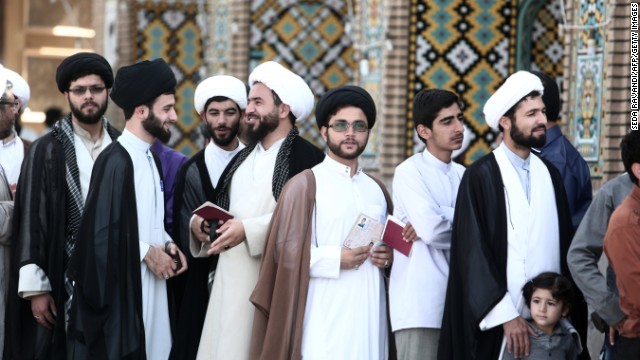 Iranian men wait to vote at a polling station at the Massoumeh shrine in the holy city of Qom, south of Tehran, during presidential elections in the Islamic republic on Friday, June 14. More than 50 million Iranian voters are eligible to go to the polls to select a new president from
Iranian men wait to vote at a polling station at the Massoumeh shrine in the holy city of Qom, south of Tehran, during presidential elections in the Islamic republic on Friday, June 14. More than 50 million Iranian voters are eligible to go to the polls to select a new president from 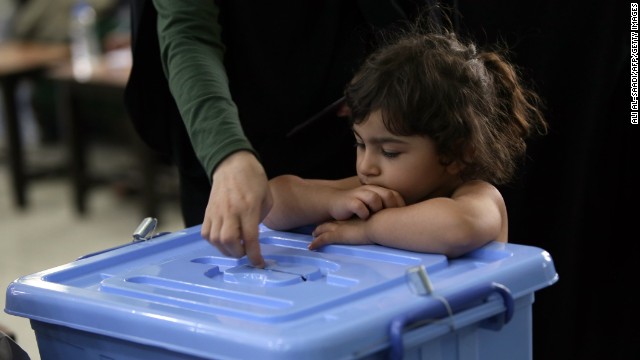 A girl looks at an Iranian national casting her ballot as she votes on June 14.
A girl looks at an Iranian national casting her ballot as she votes on June 14. 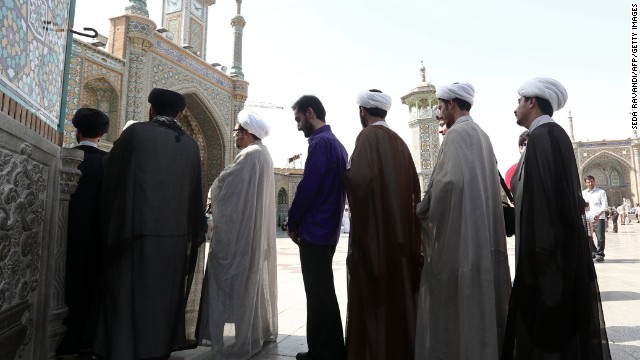 Iranian clergymen wait in line to vote at a polling station at the Massoumeh shrine on June 14.
Iranian clergymen wait in line to vote at a polling station at the Massoumeh shrine on June 14. 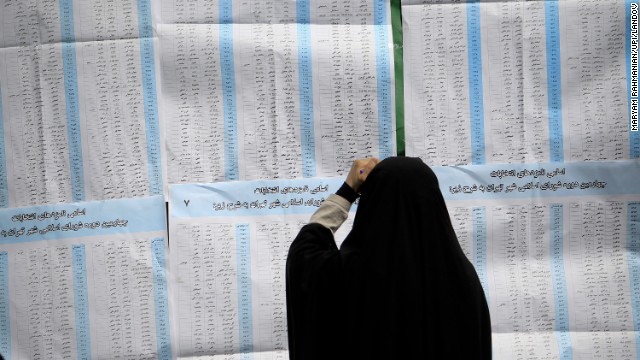 A woman checks out her ballot before voting in Iran’s presidential elections at a Tehran polling station on Friday, June 14.
A woman checks out her ballot before voting in Iran’s presidential elections at a Tehran polling station on Friday, June 14. 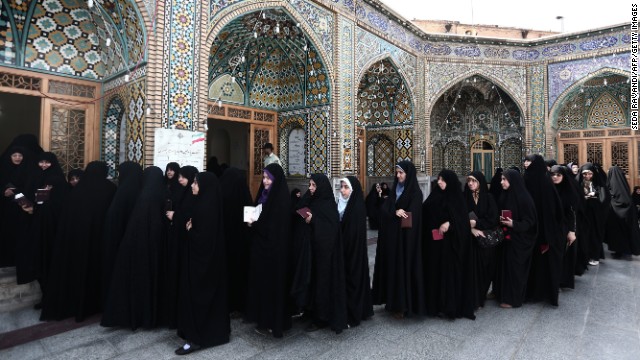 Women wait in line to vote at a shrine in Qom on June 14.
Women wait in line to vote at a shrine in Qom on June 14. 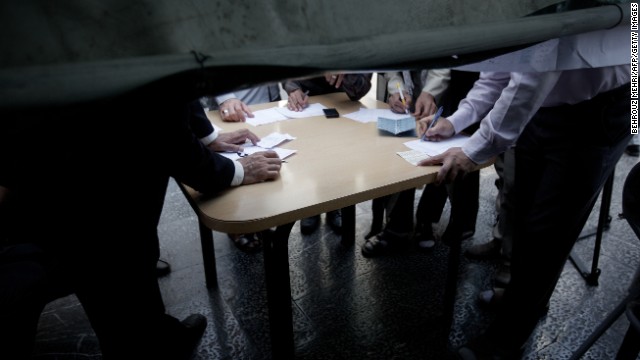 Voters fill out paper ballots in Tehran on June 14.
Voters fill out paper ballots in Tehran on June 14. 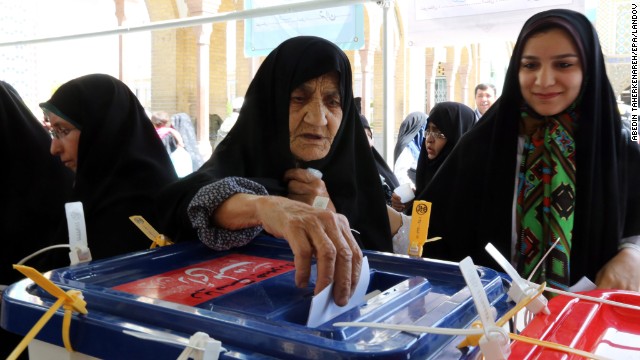 A woman casts her ballot during the Iranian presidential elections in Shahr-e-Rey on June 14.
A woman casts her ballot during the Iranian presidential elections in Shahr-e-Rey on June 14. 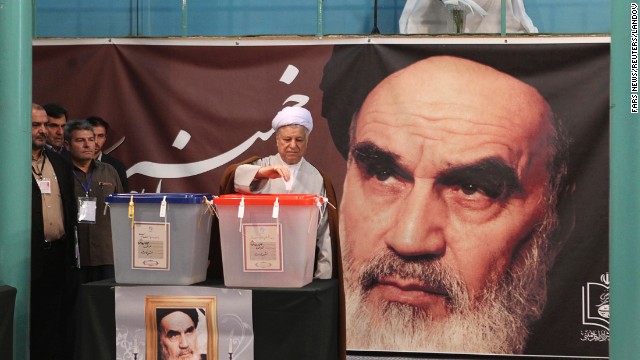 Former Iranian President Akbar Hashemi Rafsanjani votes in the Jamaran mosque in Tehran on June 14.
Former Iranian President Akbar Hashemi Rafsanjani votes in the Jamaran mosque in Tehran on June 14. 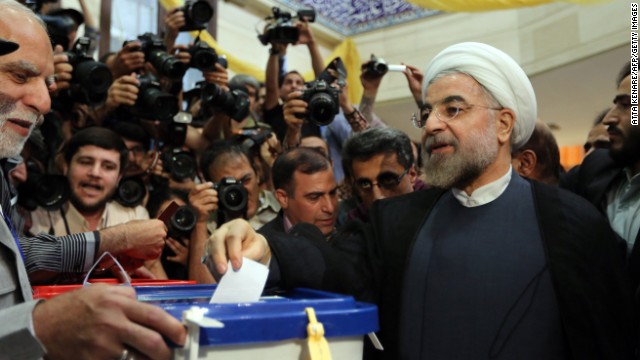 Presidential candidate Hassan Rowhani casts his vote in Tehran on June 14.
Presidential candidate Hassan Rowhani casts his vote in Tehran on June 14. 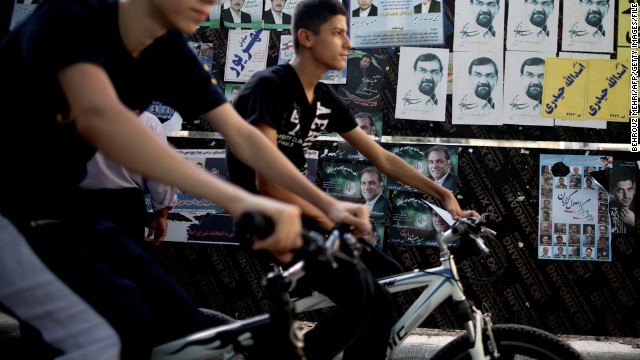 Youths ride past campaign posters in downtown Tehran on Thursday, June 13, a day ahead of the country’s presidential election.
Youths ride past campaign posters in downtown Tehran on Thursday, June 13, a day ahead of the country’s presidential election. 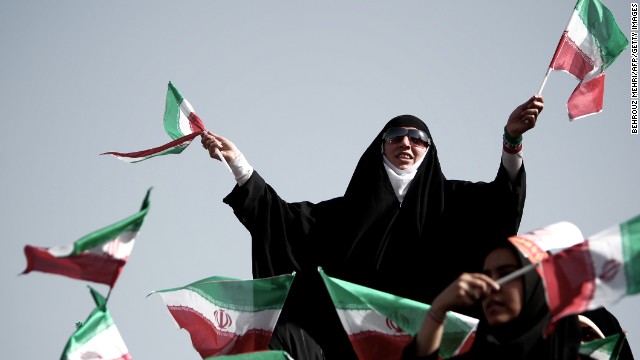 Supporters of top nuclear negotiator and conservative presidential candidate Saeed Jalili wave national flags during his campaign rally at Heydarnia stadium in Tehran on Wednesday, June 12.
Supporters of top nuclear negotiator and conservative presidential candidate Saeed Jalili wave national flags during his campaign rally at Heydarnia stadium in Tehran on Wednesday, June 12. 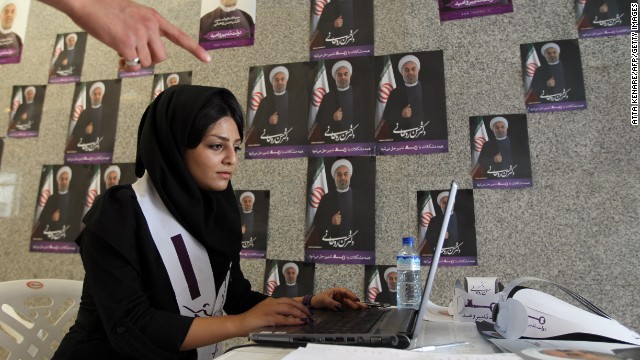 A supporter of Hassan Rouhani, moderate presidential candidate and former top nuclear negotiator, works on her laptop in one of his campaign offices in Tehran on Tuesday, June 11.
A supporter of Hassan Rouhani, moderate presidential candidate and former top nuclear negotiator, works on her laptop in one of his campaign offices in Tehran on Tuesday, June 11. 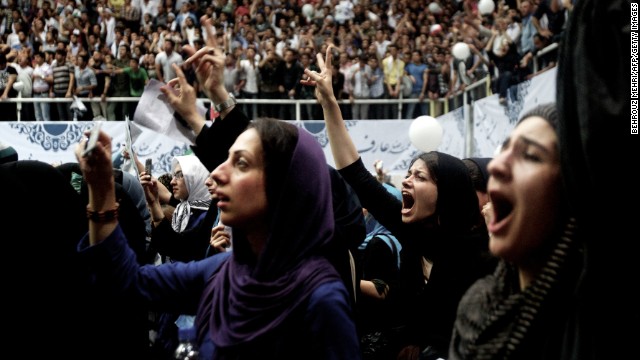 Iranian supporters of former vice president and reformist presidential candidate Mohammad Reza Aref shout slogans during his campaign rally in Tehran on Monday, June 10. Later on Monday he announced his decision to drop out of the race. Hours earlier, another candidate, Gholam-Ali Haddad-Adel, also said he was out.
Iranian supporters of former vice president and reformist presidential candidate Mohammad Reza Aref shout slogans during his campaign rally in Tehran on Monday, June 10. Later on Monday he announced his decision to drop out of the race. Hours earlier, another candidate, Gholam-Ali Haddad-Adel, also said he was out. 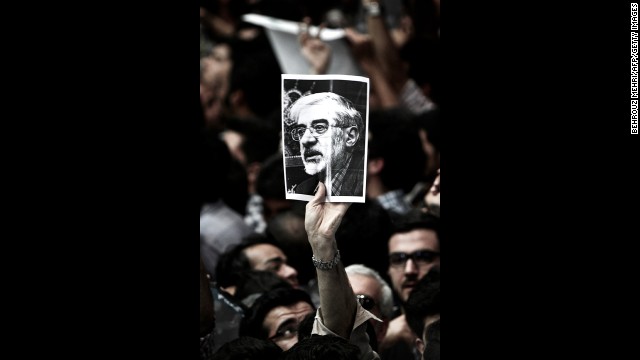 A man holds a portrait of opposition leader Mir Hossein Mousavi, who has been
A man holds a portrait of opposition leader Mir Hossein Mousavi, who has been 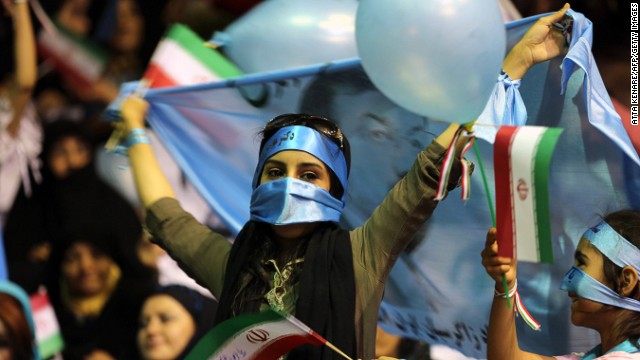 A supporter of Iranian presidential candidate Mohsen Rezaei, Iran’s top commander during the war with Iraq, holds a blue flag bearing his portrait during a rally in Tehran on June 10.
A supporter of Iranian presidential candidate Mohsen Rezaei, Iran’s top commander during the war with Iraq, holds a blue flag bearing his portrait during a rally in Tehran on June 10. 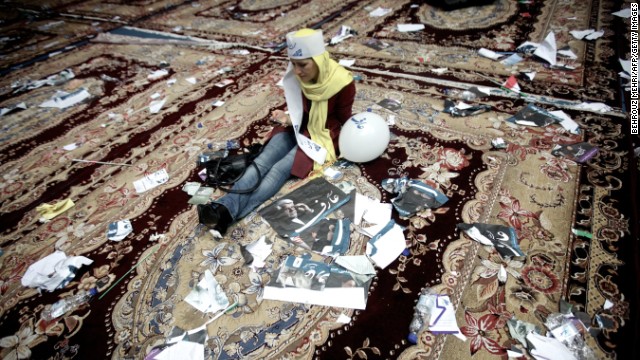 An Aref supporter checks her mobile phone surrounded by campaign posters after the June 10 rally in Tehran.
An Aref supporter checks her mobile phone surrounded by campaign posters after the June 10 rally in Tehran. 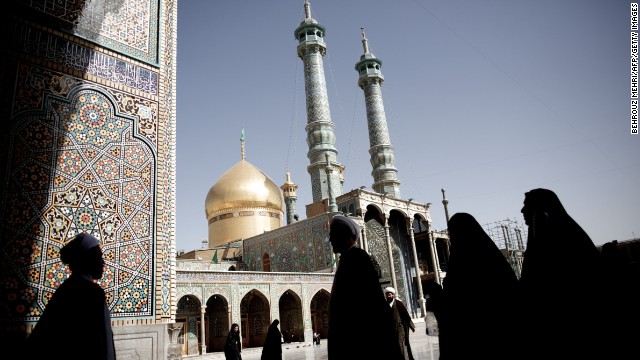 Pilgrims and clergymen walk across the courtyard of the Masoumeh holy shrine in the religious Shiite Muslim city of Qom on Sunday, June 9. Iran’s powerful bazaar merchants and Shiite clergy spearheaded the 1979 Islamic revolution, but their role in the country’s political scene has waned over the years, analysts say.
Pilgrims and clergymen walk across the courtyard of the Masoumeh holy shrine in the religious Shiite Muslim city of Qom on Sunday, June 9. Iran’s powerful bazaar merchants and Shiite clergy spearheaded the 1979 Islamic revolution, but their role in the country’s political scene has waned over the years, analysts say. 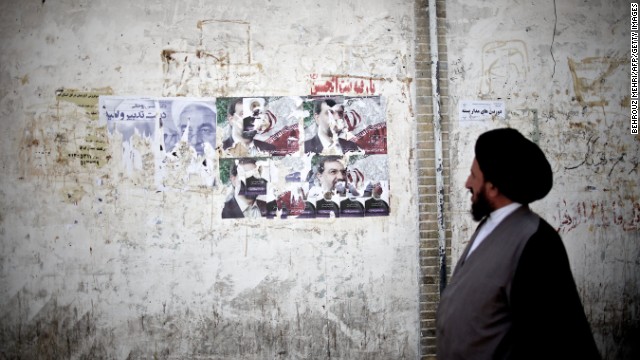 An Iranian clergyman walks past campaign posters on June 9 in Qom, south of the capital city of Tehran.
An Iranian clergyman walks past campaign posters on June 9 in Qom, south of the capital city of Tehran. 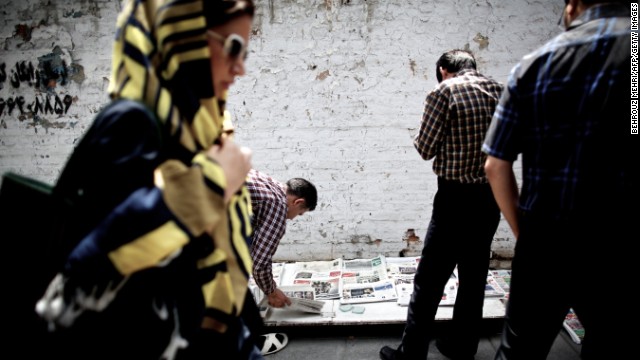 Iranians read the headlines on the front pages of newspapers unveiling the approved presidential candidates on May 22 in Tehran.
Iranians read the headlines on the front pages of newspapers unveiling the approved presidential candidates on May 22 in Tehran. 


















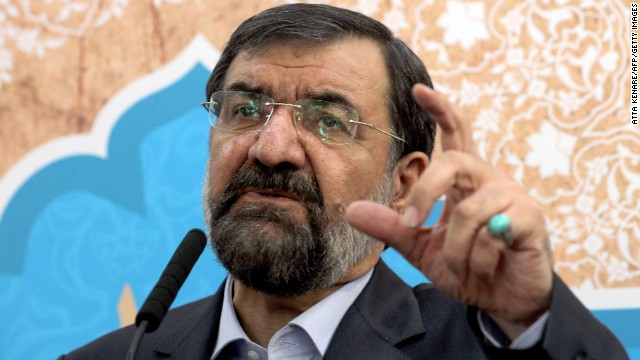 Mohsen Rezaei is currently a member of the Expediency Council and was Iran’s top commander during the war with Iraq.
Mohsen Rezaei is currently a member of the Expediency Council and was Iran’s top commander during the war with Iraq. 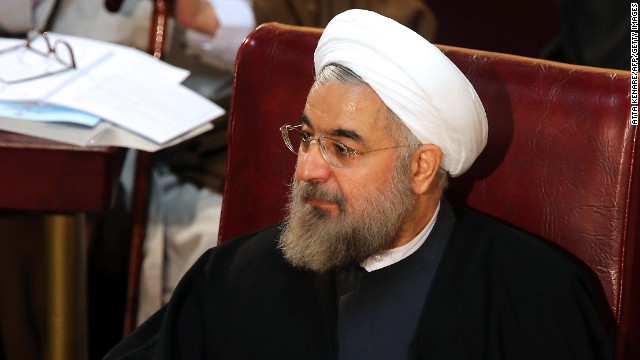 Hassan Rouhani is head of the Center for Strategic Studies and Iran’s chief nuclear negotiator under former President Mohammad Khatami.
Hassan Rouhani is head of the Center for Strategic Studies and Iran’s chief nuclear negotiator under former President Mohammad Khatami.  Mohammad Ghalibaf is a member of the Revolutionary Guard’s Corp and currently the mayor of Tehran.
Mohammad Ghalibaf is a member of the Revolutionary Guard’s Corp and currently the mayor of Tehran. 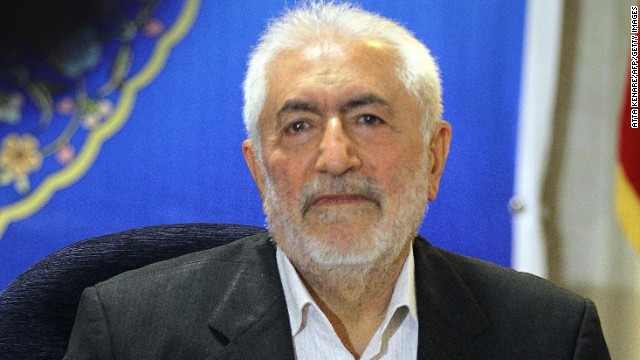 Mohammad Gharazi was a minister during Akbar Hashemi Rafsanjani’s presidency.
Mohammad Gharazi was a minister during Akbar Hashemi Rafsanjani’s presidency. 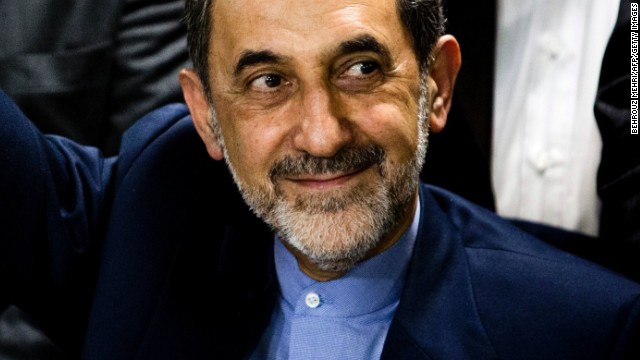 Ali Akbar Velayati was twice foreign minister during the Rafsanjani presidency and is currently the Supreme Leader’s top adviser.
Ali Akbar Velayati was twice foreign minister during the Rafsanjani presidency and is currently the Supreme Leader’s top adviser. 





No comments:
Post a Comment